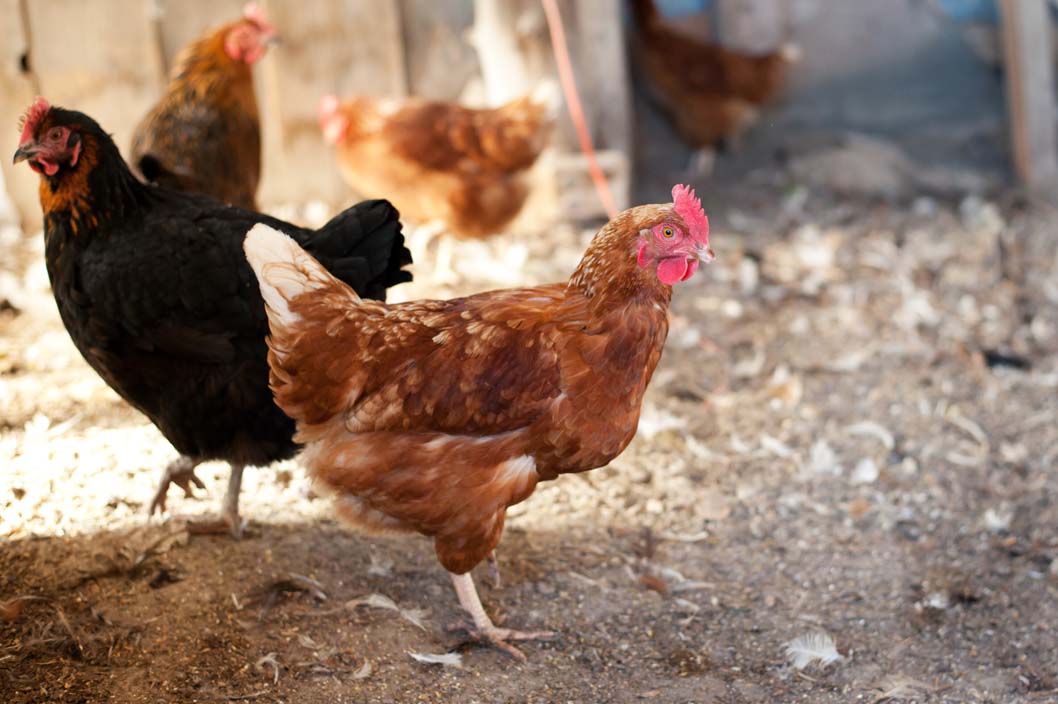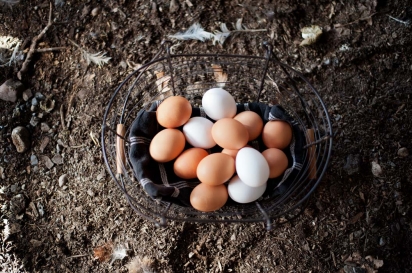The Sunny Side of Urban Chickens
In his Kingston backyard, high school teacher Nick Laan enjoys some good times with his pets. They wander about the property “getting some stretching room,” as he puts it.
“I love to be in the yard with them — in fact, I think I spend more time back there now than I used to do before we got them. They’re so entertaining.”
Entertaining, those pets may be. But they’re also useful. They eat slugs. Their manure is great for the backyard garden. Children from around the neighbourhood love them. They’re quiet and inexpensive to keep. For a city dweller, they provide a nice link to nature.
And, best of all, these pets lay eggs, as chickens do.
They're all hens, of course — the only gender allowed under Kingston’s relatively new backyard chickens bylaw. Laan has been keeping them for four years, one of 23 householders in the city who are exercising this new liberty.
Laan had fantasized about keeping chickens in his backyard for a long time. “I’d just moved from an apartment into a new home and I thought chickens would be a neat thing to keep in the city,” he says. Such talk was in the air. There was an ongoing pilot project in Kingston in which residents could, for the first time, keep chickens in their backyards. This appealed to Laan, who has always had a fantasy of living in the country.
“What pushed my wife and I over the edge was a week we spent on a farm in Ireland,” he says. “There were chickens everywhere, running around, full of life — a real addition to the time we spent there. We now knew we wanted chickens.”
Keeping them has been essentially trouble free, with only one problem, a hen who would crow in the early morning. “It was an Americana, a breed that maybe isn’t meant for the backyard. She thought she was a rooster and we sent her back to the farm.”
For residents who don’t have chickens, Laan and a few other permit holders hold occasional Tours de Coops, a chance mostly for children to see what the chicken-raising life is all about. “The children are just fascinated. Sometimes they’re learning for the first time that their morning eggs come from these birds.”
Laan was partly inspired by his colleague, fellow school teacher Michael Payne, a co-ordinator of the group Urban Agriculture Kingston, which spearheaded the campaign to allow backyard chickens. For Payne, the initiative has enjoyed “a very successful implementation.”
City council was initially dubious. Only a minority of council members were supportive.
“They came up with some plausible objections that we were able to deal with easily,” Payne recalls.
Some councillors and residents worried that backyard chicken coops would attract coyotes, which were occasionally spotted in the city. But coyotes are opportunistic hunters that are easily defeated by a well-constructed chicken coop, Payne says.
Some councillors worried about avian flu, but again, enclosed chickens don’t have the encounters with wild birds that allow transmission of the virus.
Many feared chickens would create noise problems. Payne had data showing that hens, unlike roosters, were generally very quiet. (And he now has proof in practice. A neighbour asked him when he was going to actually get hens for the coop he’d built — and Payne replied that he’d already had them for six months.)
As for concerns about sanitation, Payne could point out that hens produce much less waste than cats and dogs and their waste can easily be transformed into a nitrogen-rich garden fertilizer. Regulations would merely have to require that owners clean their coops regularly and keep manure in a closed composter.
For councillors who worried about public nuisance complaints, Payne could respond that cities that already allowed backyard chickens had very few complaints. (His own prediction, expressed in a 2010 editorial in The Kingston Whig-Standard, was that bylaw officers would only have to deal with six complaints each year, far fewer than the 447 dog-related complaints received the year before.)
Payne could point out that, in Ontario alone, Guelph, Waterloo, Brampton, Niagara Falls and Quinte West already allowed backyard chickens.
On a positive note, backyard chickens would teach children about where food comes from and about animal husbandry, provide completely fresh eggs to owners and encourage an ecologically sustainable lifestyle.
It was a pretty strong case, but council was initially reluctant to support the policy. As councillor Jim Neill recently said, “We’re a small ‘C’ conservative city and sometimes a little reticent about change — and the concerns about disease and noise and ramshackle chicken coops gave a few people some pause.”
In the end, council decided to allow a pilot project to determine if the policy would create problems, passing a resolution to that effect in spring of 2011. Over the ensuing two and a half years, no problems were reported.
Reassured by that experience, council passed a bylaw in November 2013 to allow residents to keep backyard chickens. The vote in support was nearly unanimous, 12 to 1.
To help mitigate issues, the Kingston bylaw stipulates that only six hens may be kept (roosters are prohibited), the owner must live on the property, hens must be in their coops from 9 p.m. to 6 a.m., hens must be in an enclosed run when not in their coop, sales of eggs are prohibited, coops and runs must be free of odours and vermin and home slaughter is prohibited.
There was very little community opposition to the proposal, Payne recalls, no organized opposition, no humane society, no ad hoc groups.
“What impressed me was how well council listened. They had had sincere concerns, but were completely open to the evidence.”
From the perspective of the city administration, the policy has been trouble-free. As Greg McLean, policy and program co-ordinator with the city’s licensing and lnforcement division, says, “We could say that the process has been complaint-free.” To be sure, there had been a single complaint regarding odour, but investigators determined it was unfounded.
While a total of 30 permits to keep backyard chickens have been issued, only 23 have been active at any one time, McLean said. The permits are renewed annually.
Are there prospects of bringing such a policy to Ottawa? Very few, according to Adam Brown, the city’s manager of rural development review. Staff and city councillors do receive occasional inquiries, but “a study to consider backyard chickens is not on the planning and growth management department work plan at this time,” Brown said in a statement.
Perhaps a citizen initiative modelled on Kingston’s experience could change that.
KINGSTON'S BYLAW KEEPS THE CHICKENS IN CHECK
In November 2013, Kingston city council passed a bylaw allowing backyard chickens. To help mitigate complaints, it stipulates that:
• only six hens may be kept — roosters are prohibited
• the owner must live on the property
• hens must be in their coops from 9 p.m. to 6 a.m.
• hens must be in an enclosed run when not in their coop
• sales of eggs are prohibited
• coops and runs must be free of odours and vermin
• home slaughter is prohibited






